News
Italy looks to ban cell-based meat to preserve food heritage
11 Apr 2023
Italy has moved to ban the use of cell-based food, citing quality issues and the preservation of the country’s gastronomic heritage – but the government faces criticism from food industry groups.
Government proposals, approved by ministers last month, would look to ban the production and placing on the Italian market of foods derived from animal cells without slaughtering the animal.
Along with cell-based fish and synthetic milk, the draft legislation highlights cultured meat, which the document states is the “result of a cell cultivation process”.
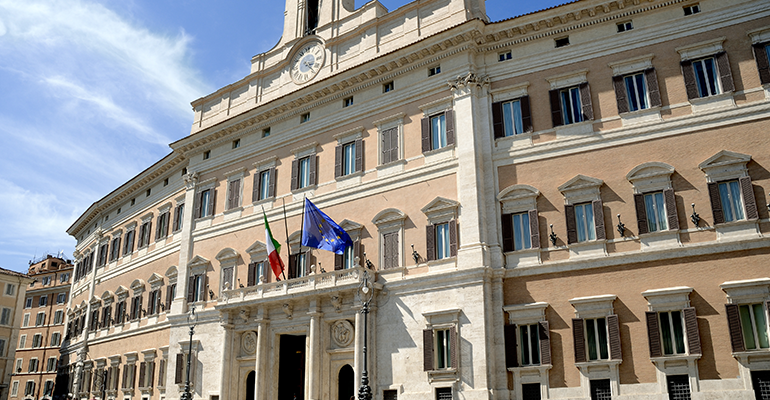
The law also proposes a fine of €10,000 to €60,000 for any infringement of the intended ban.
“Laboratory products in our opinion do not guarantee quality, well-being and the protection of our culture, our tradition," said minister Francesco Lollobrigida, a senior member of prime minister Giorgia Meloni's Brothers of Italy party.
“The ban is based on the principle of caution,” added health minister Orazio Schillaci. “This is very important because currently there is no scientific evidence about possible harmful effects from consumption of synthetic foods.
“I think it is also important to reiterate the preservation of the agri-food heritage of our nation.”
Coldiretti: ‘Synthetic food limits choice and supply’
Agriculture lobby Coldiretti welcomed the move against "synthetic food", with the group’s president Asti Marco Reggio saying it “limits the freedom of consumers, homogenises food choices, and monopolizes supply”.
“It does not help to pursue social justice objectives,” he added, “as it is produced on the basis of patents and technologies with high entry and development costs.
“In the hands of a few large multinational investors it can have dangerous socio-economic impacts.”
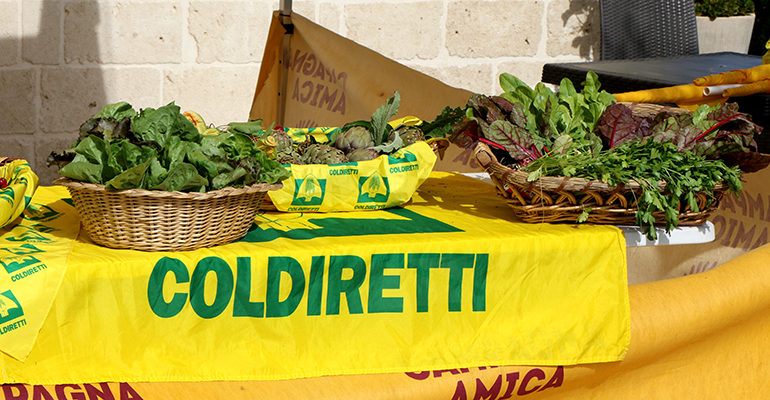 Pictured: Coldiretti - the largest association of representation and assistance of Italian agriculture | © AdobeStock/Massimo Todaro
Pictured: Coldiretti - the largest association of representation and assistance of Italian agriculture | © AdobeStock/Massimo Todaro
But advocates for cell-based meat responded saying the proposals went against innovative progress and customer choice and would hamper efforts to protect the environment.
Alice Ravenscroft, head of policy at the Good Food Institute (GFI) Europe, said, “Italy would be left behind as the rest of Europe and the world progresses towards a more sustainable and secure food system.”
“The government should let Italians make up their own minds about what they want to eat, instead of stifling consumer freedom.”
The GFI also cited studies that cell-based meat could cause up to 92% less emissions than conventional beef.
It could also reduce air pollution linked with meat production by up to 94% and use up to 90% less land – freeing up space for more sustainable farming practices, satisfying growing meat demand while protecting the environment.
Regulatory stance on cell-based meat in Europe and beyond
Before any cell-based meat product can be sold in Europe, it needs to be approved by the European Food Safety Authority (EFSA).
At the time of writing, neither EFSA or any EU member state food agency has received a novel food dossier from a company involved in cell-based meat production.
Other EU countries are investing in lab-grown meat
Italy’s stance is in contrast to other member state governments eager to unlock the benefits of cell-based meat as well as countries such as Singapore and the US.
In 2022 the Netherlands announced €60m of government funding towards research and development of cell-based meat and precision fermentation.
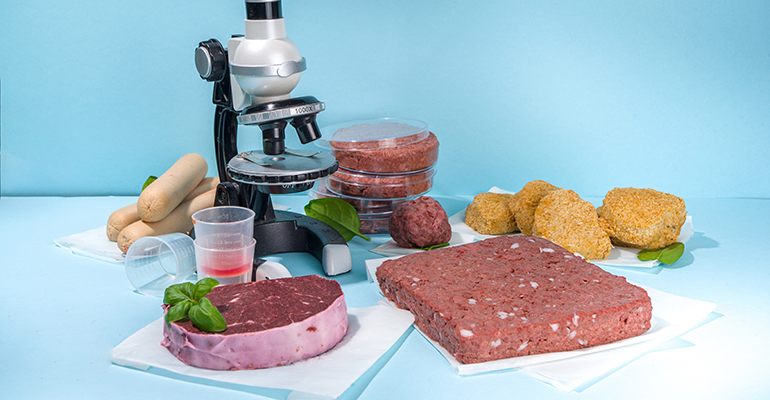 Pictured: Lab-grown meat alternatives | © AdobeStock/ricka_kinamoto
Pictured: Lab-grown meat alternatives | © AdobeStock/ricka_kinamoto
Meanwhile, the UK government announced a €18.2m (£16m) funding call for sustainable proteins, including cell-based meat.
In 2021, the Spanish government invested €5.2m in a project investigating the potential for cell-based meat to help prevent diet-related diseases.
Further afield, the Singapore became the first country to grant regulatory approval to a cell-based meat product in December 2020, when US startup Eat Just received the regulatory green light for its cell-based chicken.
In 2023, two separate cell-based meat products made by UPSIDE Foods and GOOD Meat have passed the United States Food and Drug Administration’s (FDA) pre-market safety review.
‘Proposed ban contains misinformation and may stymie efforts’
Food companies' network Cellular Agriculture Europe also said the move would limit consumer choice and add to the environmental damage caused by satisfying meat demand of a growing population.
“This ban could be damaging in strengthening Europe’s food self-sufficiency in the face of fragile supply chains, increased domestic and international supply constraints and its competitiveness in the global agri-food industry, which is one of its areas of excellence,” it said.
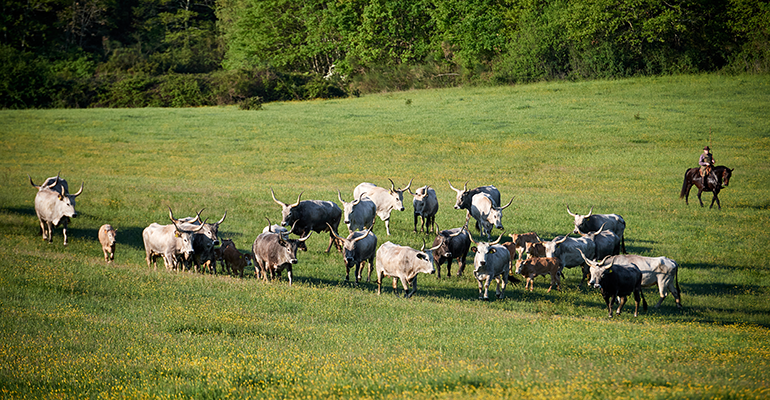 Pictured: Herd of Maremmana Cows in Italy | © AdobeStock/nicole_ciscato
Pictured: Herd of Maremmana Cows in Italy | © AdobeStock/nicole_ciscato
“This proposed ban contains misinformation and may only stymie efforts to make our agri-food systems more sustainable and deny Italian consumers complementary protein choices. Not only is that bad public policy, it is likely unconstitutional.
“The better path forward is to work with our companies and to support research on how these innovations can integrate with conventional agriculture to better achieve national climate and food security goals.”
Related news

California companies required to disclose heavy metal content in baby food
10 Jan 2025
As of January 2025, baby food manufacturers selling in California must disclose test results for four heavy metals – arsenic, lead, cadmium, and mercury – via an on-pack QR code.
Read more
Snack trends, ingredient claims, and plant-based perceptions: Highlights from Fi Europe 2023, part 1
7 Dec 2023
Value-led snacking, sustainability storytelling, and the importance of having a ‘star ingredient’: we asked consumer analysts and market experts at Fi Europe about the trends and innovations that are shaping the food industry.
Read more
Confirmed: California bans four ‘toxic’ food additives
10 Oct 2023
Four food additives, including the colouring Red No. 3, will be banned in food in the US state of California over safety concerns, with public health campaigners hoping this will spark a nationwide ban in the coming years.
Read more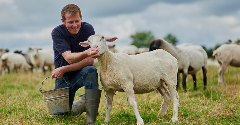
Advocacy groups condemn EU Commission for backpedalling on animal rights
3 Oct 2023
Amid rumours that the EU may abandon its plans to improve animal welfare in farming and end the use of cages, many stakeholders have condemned this possibility and urged the EU to reconsider.
Read more
Poland and Ukraine attempt to resolve grain dispute
29 Sep 2023
Poland and Ukraine have begun talks to try to resolve a dispute regarding the ban on Kyiv’s grain imports that prompted Kyiv to file a lawsuit to the World Trade Organization.
Read more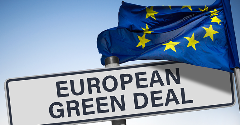
The EU may be set to scrap its sustainability commitments
27 Sep 2023
A speech delivered by President Ursula von der Leyen last week inferred that the EU could be drawing back on its commitments to create a more sustainable and healthier food system.
Read more
Industry first: Mosa Meat becomes first cultivated meat startup to gain B Corp certification
11 Sep 2023
A first for the industry, Dutch cultivated meat company Mosa Meat announced that it has received B Corp certification and will soon apply for regulatory approval across the globe.
Read more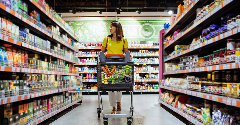
German supermarket trials climate-centric pricing model
29 Aug 2023
German discount supermarket Penny has trialled increasing product prices to mirror their health and environmental costs.
Read more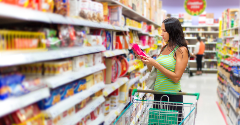
EPR fee delay spurs concerns over UK’s sustainability commitment
8 Aug 2023
The UK government’s decision to push back the introduction of fees for the Extended Producer Responsibility (EPR) due to inflation has raised doubts about whether this sustainability commitment will ever be realised.
Read more
Latino-owned food startups tackle climate change
25 Jul 2023
A growing list of Latino-founded food and beverage startups in the US are putting sustainability at the forefront of their businesses for the sake of the planet.
Read more